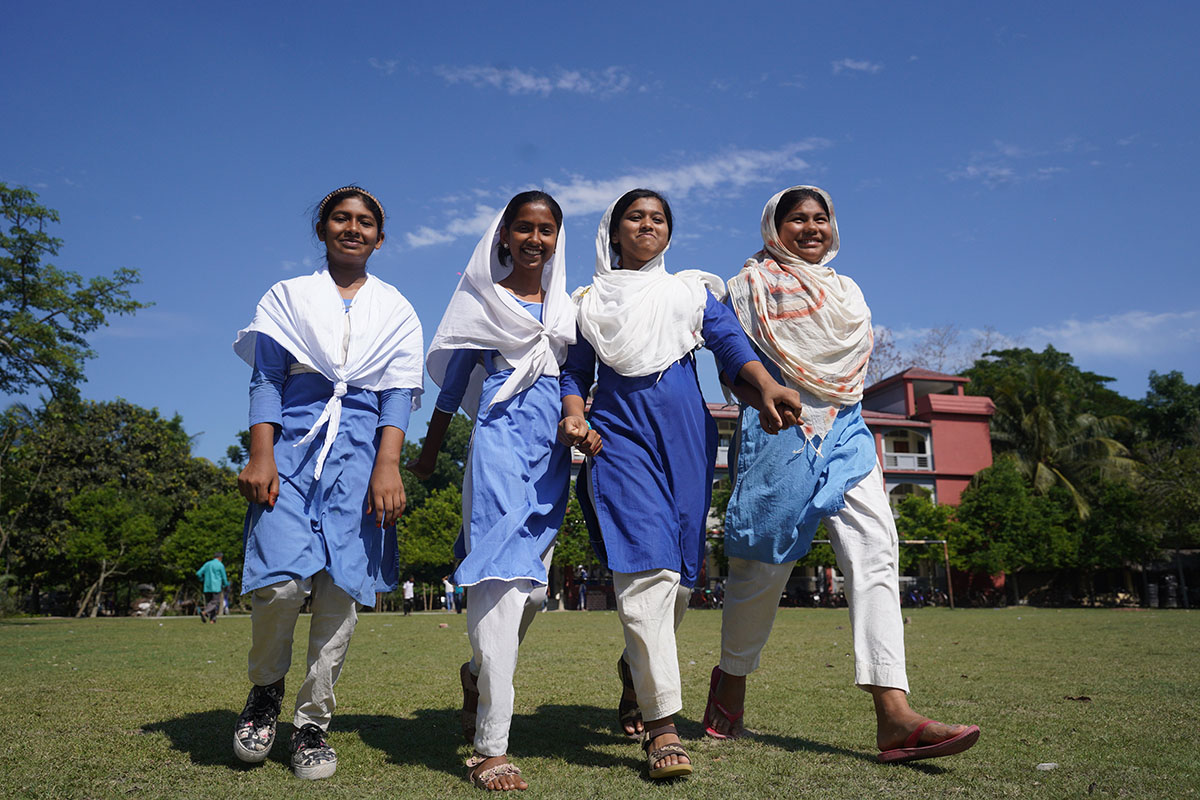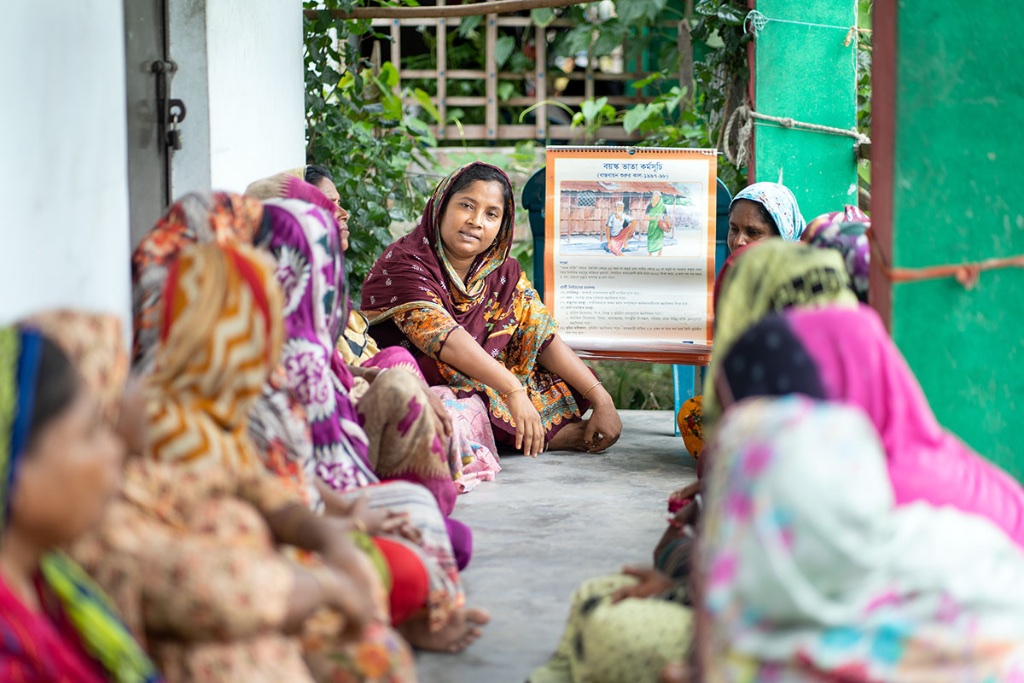


Major Achievements of Uttaran’s Different Programmes
1. Transfer of Assets (Land) to Landless to eradicate poverty:
Land rights and fair distribution of khasland remains key to breaking the chain of poverty in Bangladesh and accelerate growth. We work to hold the government and it’s agencies to accountable to ensure transparency in the policy decisions that impact the southwest. Uttaran facilitation through a unique multi-stakeholder process, in close cooperation with the state administration, for the landless of Satkhira and Khulna districts. Uttaran’s advocacy initiatives, has recovered land from illegal occupants and transfer to landless families. Uttaran is implementing three land rights project with support from Manusher Jonno Foundation/UKAid, shiree/UKAid and European Union. Through the two projects of Uttaran funded by Manusher Jonno Foundation/ UKAid and Shiree/UKAid, from 2004 to till date, total 41,762 landless poor households have accessibility to 17,461.818 acres of khasland and khas water bodies and additionally around 15430 landless people are in position of khasland.
2. Climate justice, adaptation, food security and sustainable agriculture programme: Community-based river basin management:
Community based river basin management has been another long term work of Uttaran which has resulted in ecological restoration of rivers in southwest coastal region and scaling up of indigenous water management knowledge and practices. Southwest coastal region, over the last several decades, witnessed imposition of structural solution of river management at the cost of traditional practices. Uttaran worked closely with local communities to learn and successfully persuade the national and international policy makers to adopt indigenous water management practices. For instance Tidal River Management (TRM) is there to solve the water logging problem. TRM has been accepted by the first PRSP as priority method for river management in the region. Uttaran advocacy together with the community platform, the Pani Committee, has ensured community participation in the decision-making process. Uttaran, together with Pani Committee, and a number of scientific and knowledge institutions, has developed a Peoples Plan of Action for River Management in Southwest Region, a remarkable example of bottom-up planning incorporating indigenous knowledge and ensuring community participation. Now policy makers are acknowledging Uttaran’s People’s Plan for solving water logging problem of southwest region of Bangladesh.
3. Food Security through Agriculture Value Chain:
Aquaculture: Uttaran supports farmers on how to prepare land, nursery management, water management, modern farming system, disease control, use of pro-biotic etc. Uttaran provides farmers with a water quality measurement Kit Box, through which the farmers tests the soil quality, water PH, water salinity and temperature. Cross visits were organized to exchange knowledge between lead farmer and other farmers. Additionally, Uttaran prepares display plots to encourage other local shrimp farmers to follow the shrimp farming technology. These activities have enhanced the technical knowledge of the farmers thus enabling them to increase their production and earn more money, thus increasing their food security. More than 10,000 farmers received this support from Uttaran.
Horticulture: Uttaran provides the group members with knowledge, skill development training and support on good quality seeds, use of organic fertilizers, soil test, good agricultural practice on vegetable and fruits and pest control. Display plots on vegetable cultivation using sex pheromone trap and organic fertilizers were established by Uttaran. Dragon fruit trees were planted on pilot basis with the help of the Bangladesh Agriculture University. Cross visits on among the farmers were organized for knowledge exchange. Around 15,000 households received this support from Uttaran.
Dairy: Farmers are provided with training to increase their dairy production, cow species selection, cow sheds, fodder management, vaccination, disease control and cattle rearing. Hybrid Napier grasses and Jambu grasses are introduced among the farmers groups for ensuring better fodder for the cow. Through cross visits and field days, the farmers are introduced to the new technologies. Besides, Hydroponic fodder is also being introduced among the farmers with the help of Bangladesh Agricultural University. The trained CLSPs provide health and vaccination supports for the cattle. Uttaran also provides support to small businesses focused on supplying dairy farmers with enhanced quality sources of nutrition for their dairy cows, and on other services needed by dairy farmers but generally not present or of inappropriate standard. Around 8700 farmers received this support through Uttaran.
Market Linkages: Four Vegetable and fruits collection centers were constructed in Dumuria, Chitolmary and Kolaroa Upazila so that the farmers could bring their vegetables and fruits. From these collection centers, through a buying and selling committee, the products are transported into different markets in Dhaka, Chittagong, Barisal and other places across the country. This year, 16 metric ton of mangoes were export in European countries such as Italy, France, Germany and UK. In few days 10-15 metric ton mangoes have pipe line for export in European countries. On the other hand about 25 metric ton mangoes were sold to CIC Agro Ltd. Ispahani Agro limited, Basher Agro Ltd. and their chain shop in Dhaka “Agora”. Similarly, 409 metric tons of Palm (jujube), summer tomato and other agricultural products were sold to Basher Agro and other vegetable dealers in Dhaka and other parts of the country. Similarly four fish collection centers regularly collect fish from producer groups and send to Faruque sea food Ltd. On the other hand two milk collection centers regularly collect milk from producer groups and send to BRAC Chilling centre. Additionally, the project initiated the establishment of a village super market in Dumuria Upazila of Khulna district which will be first of its kind in Bangladesh.
Food Bank: In the south of the country, frequently there are only two rice harvests throughout the year; the principal Boro crop, harvested in May, the winter Amon rice, harvested in December. Harvests are important to subsistence farmers and day labourers not just for the food they produce, but also the work they provide. The period between August and October therefore squeezes the poor rural population from three sides; household stocks left over from the May harvest have been depleted, thus compelling them to purchase rice, rice scarcity means that prices are often 30% higher than during the harvest season, and there is little or no paid work available locally to provide ready money for this purpose. Considering this situation Uttaran started to operate 16 Food Banks in disaster prone southwest region of Bangladesh. Uttaran is purchasing rice and distributing 140 kg rice among the poor and marginalized community people during the lean season while the price of rice is going up and the scope of employment opportunity is very limited. They are paying back 147 kg. rice to Uttaran Food Bank during harvest and low price season and the scope employment opportunities are sufficient. Based on our experience we can share that the recovery rate of paying back rice is 99 per cent. From 2011 to till to date 11,655 families received food, support amounting 1631.70 MT. rice.

